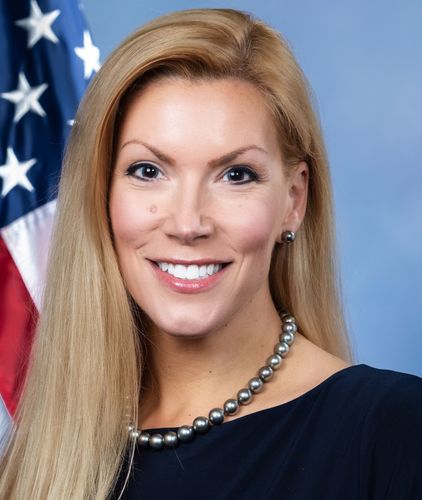Texas lawmaker introduces bill to repeal 45Z clean fuel production credit

Rep. Beth Van Duyne, R-Texas
January 29, 2025
BY Erin Voegele
Rep. Beth Van Duyne, R-Texas, on Jan. 16 introduced a bill that aims to repeal the Section 45Z clean fuel production credit. The tax credit, established by the Inflation Reduction Act, supports the production of various low-carbon transportation fuels.
The technology-neutral credit is available for numerous biobased and renewable fuels, including sustainable aviation fuel (SAF), renewable diesel, ethanol, renewable natural gas (RNG) and biodiesel, provided they meet lifecycle greenhouse gas (GHG) reduction requirements. To qualify for the credit, fuels must be produced in the U.S. and emit not more than 50 kilograms of carbon dioxide equivalent (CO2e) per million British thermal units (mmBTU), as calculated by the U.S. Department of Energy’s GREET model. The lower the carbon intensity (CI) of the fuel, the higher the tax credit the producer can claim.
The credit is currently in place for 2025-2027. For facilities that meet prevailing wage and apprenticeship requirements, the value of the credit is up to $1 per gallon for non-aviation fuel and up to $1.75 per gallon for SAF. The base credit for facilities that do not meet prevailing wage and apprenticeship requirements is 20 cents per gallon and 35 cents per gallon, respectively.
Advertisement
The U.S. Department of Treasury and Internal Revenue Service on Jan. 10 released initial guidance on the 45Z clean fuels production credit, including a notice of intent to propose regulations and a notice providing the annual emission rate table for the credit. That guidance aimed to provide clarity on which entities and fuels are eligible for the credit and how taxpayers determine lifecycle emissions. Specifically, the guidance outlines Treasury and the IRS’ intent to define key concepts and provide certain rules in future rulemaking. A final rulemaking has not yet been proposed.
The bill introduced by Van Duyne on Jan. 16, H.R. 549, would repeal the 45Z tax credit in its entirety, effective Dec. 31, 2024. Following its introduction, the bill was referred to the House Committee and Ways and Means. To date, no other lawmakers have cosponsored the legislation.
Advertisement
Related Stories
On Sept. 22, the Sustainable Aviation Buyers Alliance announced a new initiative to enable COP30 attendees to support the clean energy transition and address emissions from their air travel via the use of sustainable aviation fuel (SAF).
oneworld alliance, airlines and Breakthrough Energy Ventures launch investment fund to advance and commercialize SAF technologies
oneworld alliance and member airlines, in partnership with Breakthrough Energy Ventures, on Sept. 17 announced the launch of a new investment fund designed to address the limited availability and high cost of today's SAF.
Korean Air has expanded its use of domestically produced sustainable aviation fuel (SAF), introducing a SAF blend on flights to Kobe and Osaka. The flights will be fueled with a 1% SAF blend from Sept. 19, 2025, through Dec. 31, 2026.
The U.S. EPA on Sept. 18 released data showing 1.79 million RINs were generated under the RFS in August, down from 2.16 billion generated during the same month of 2024. Total RIN generation for the first eight months of 2025 reached 15.1 billion
The U.S. EPA on Sept. 18 published updated small refinery exemption (SRE) data, reporting that 10 new SRE petitions have been filed under the Renewable Fuel Standard in the past month. A total of 23 SRE petitions are currently pending.
Upcoming Events










